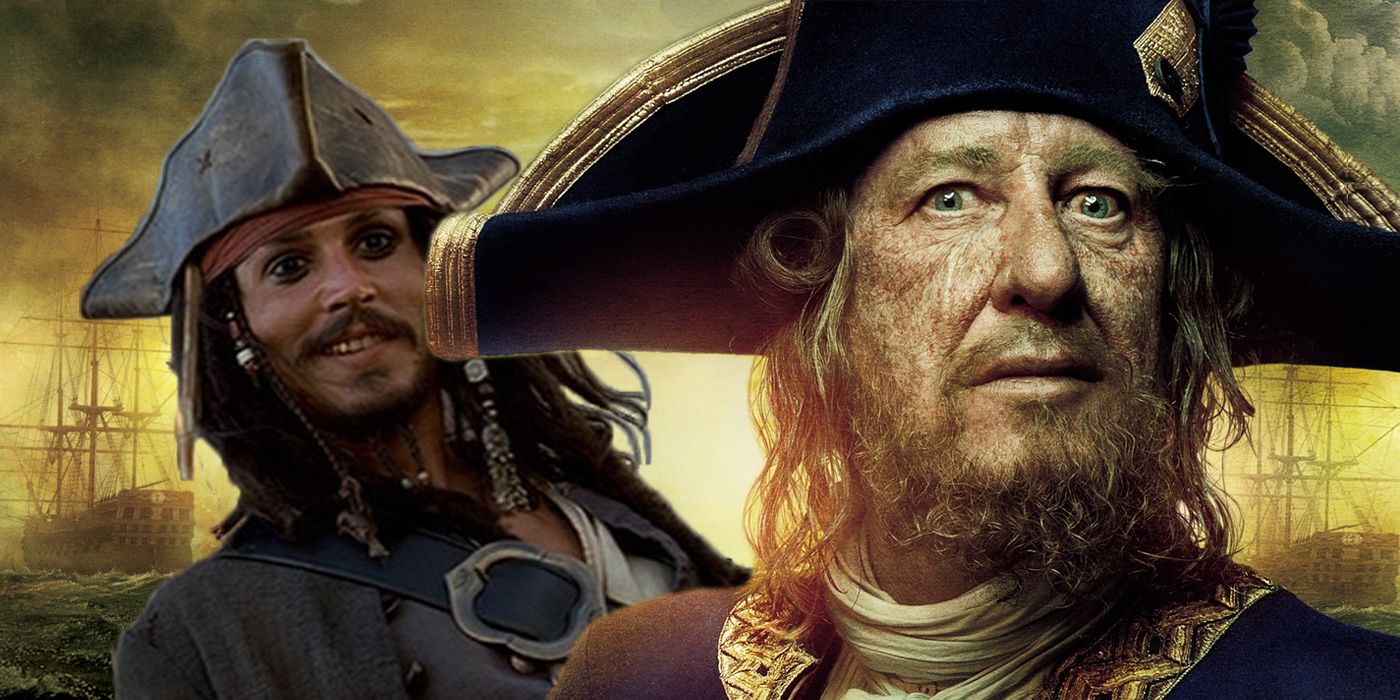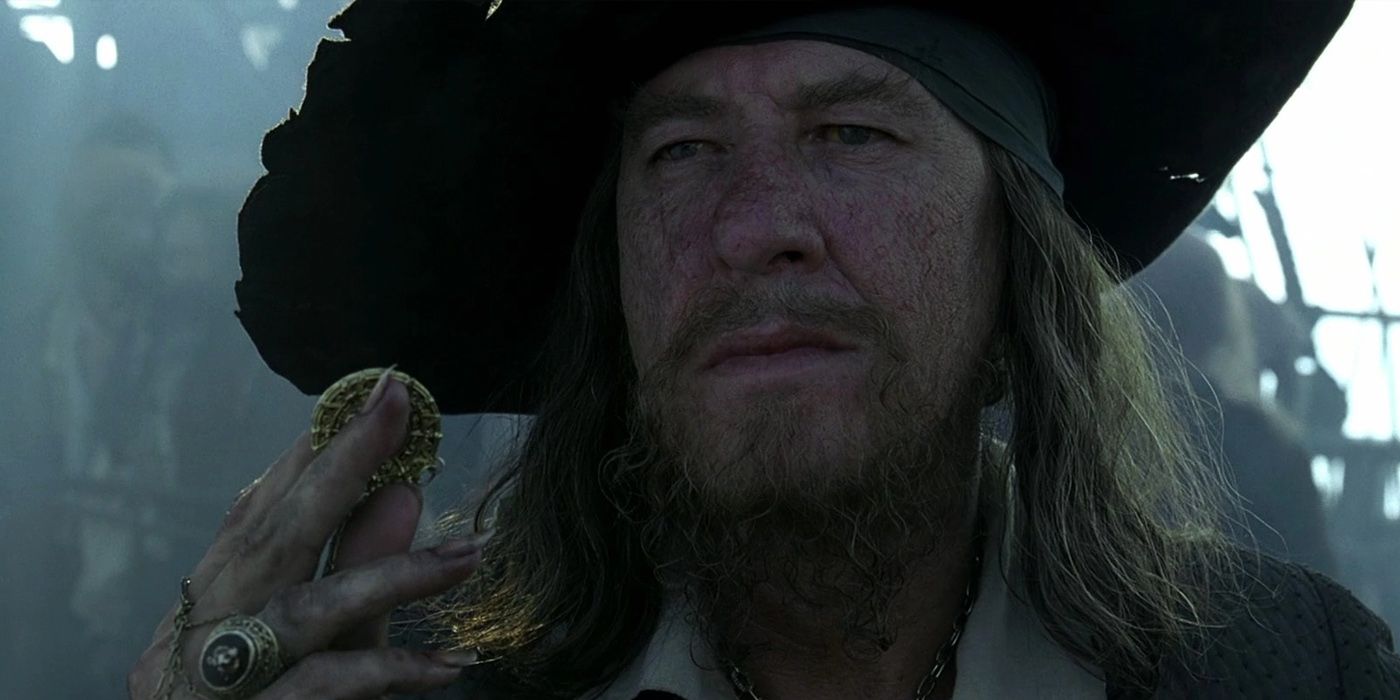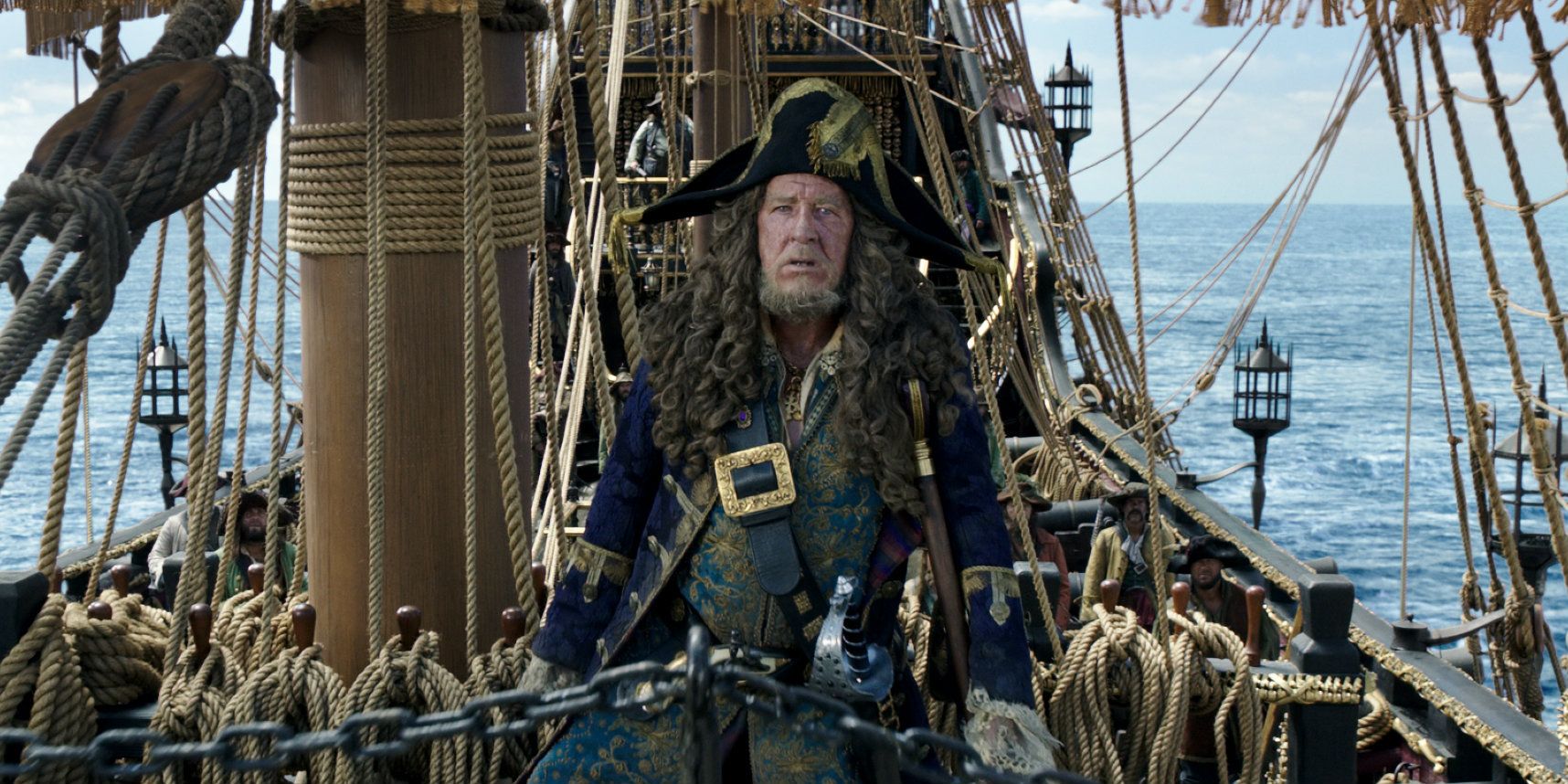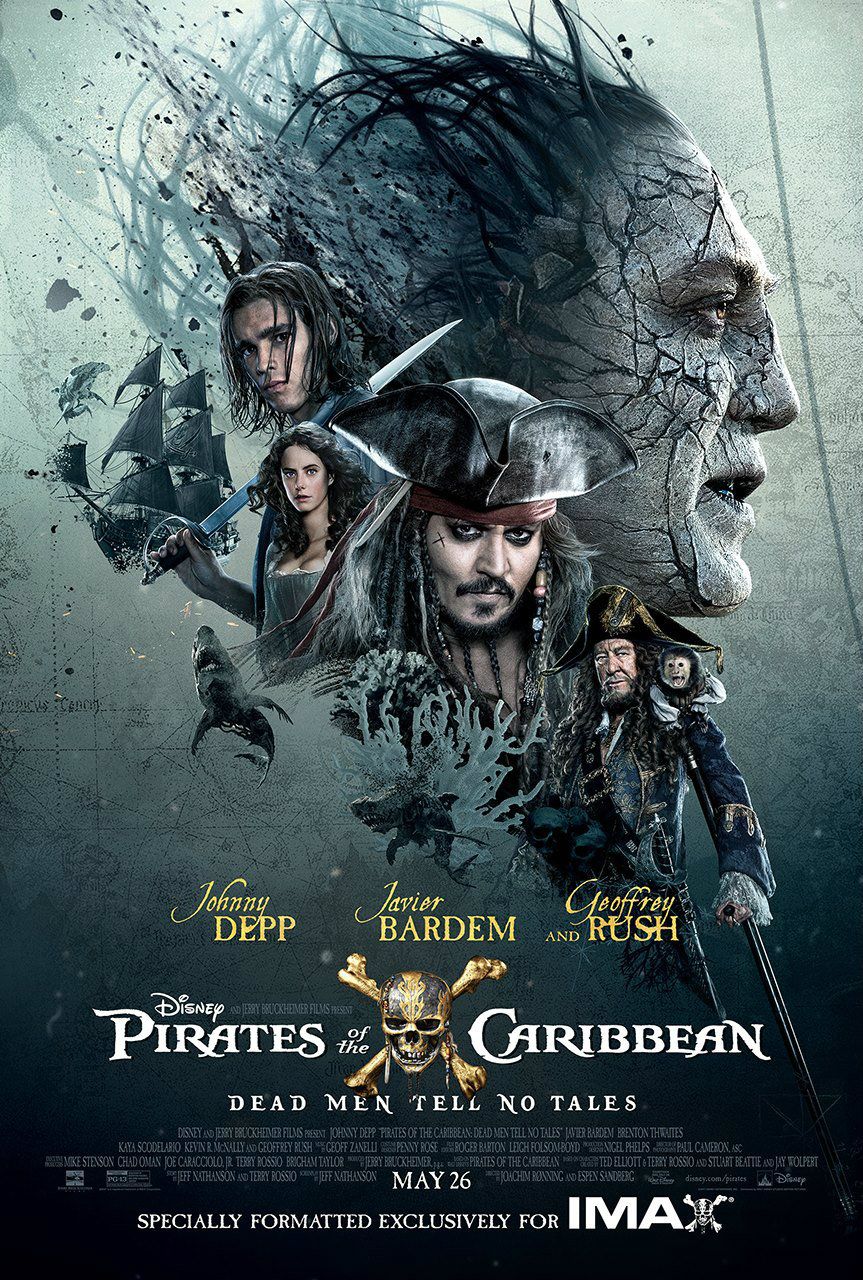With the release of Dead Men Tell No Tales, Johnny Depp has now fronted five Pirates of the Caribbean films, over which time he's turned Jack Sparrow into an icon. But while he is undoubtedly the series' MVP, when it truly comes down to it the true hero of the franchise is Geoffery Rush's Captain Hector Barbossa.
Jack's appeal is obvious. He's a funny, unlikely hero who takes on insurmountable odds with the literal swagger of a drunk making his way to the bar. And like a drunk, Jack hasn't really changed. In each movie he starts out lacking something material - the Pearl, Davy Jones' heart, his life/soul, access to the fountain of youth/the Pearl again, and the trident of Poseidon respectively - and then over two-and-a-bit hours of coincidental back-and-forth manages to acquire, destroy or otherwise achieve his goal, but along each journey he never learns or evolves as a person. You can dive into any movie and not have to worry about where you are; he'll betray Will Turner on a whim in 2003's The Curse of the Black Pearl and he'll betray Henry Turner even more readily in this year's Dead Men Tell No Tales. The only changes are in how the movie's present him, with the repeated lucky escapes turned into potentially intricate plans and his faux inebriation upped as Depp's performance becomes more distorted.
And that's fine when you want an accessible blockbuster series with recognizable elements, but not when this figure is your protagonist; over the past fourteen years Jack's evolved from a questionably-skilled, always lucky Keith Richards impression aiding Orlando Bloom and Keira Knightly into a lead who's the very embodiment of what the knockabout series was trying to satirize. The shift happened somewhere in the first back-to-back sequels, Dead Man's Chest and At World's End, where in amongst all the betrayal and haphazard tackling with Davy Jones (Bill Nighy's squid-faced Captain who remains the series' best character) he was suddenly made into a great Pirate Lord whose survival was tantamount. The stagnation is reflected in the stories, with each movie following a far too rigid formula laid out by the original; someone from Jack's past played by a lauded actor comes back with a vengeance and a mythical ship manned by an undead crew to hunt down a MacGuffin that will allow them to rule the sea and/or Jack's compass, along the way coming across a witch and the closing-in British. It's all meant to be a bit of fun, but the clash of silly and epic is feeling tired.
This character decline has both helped and hindered the series. Financially Pirates is as sound as it ever was because of that familiarity, yet the general enthusiasm has waned, mainly because of similar fatigue with Johnny Depp; in 2010 he made Alice in Wonderland a billion dollar hit when such a record was a rarity, last year due to a mixture of exhaustion and well-publicized personal issues the sequel made a quarter of that. Captain Jack has been doing the same old thing for a decade-and-a-half and it's now a bit tired.
What made him work so well is that he's not really made to be a lead. You don't know him, you don't really understand him. In contrast, though, we have Hector Barbossa. At every step where Jack chose to perv over a girl far too young for him and quip savvy, Rush's true pirate has shown nuance and personality, evolving over the movies. Forget Jack - Barbossa's the real hero of Pirates of the Caribbean.
Next Page: [valnet-url-page page=2 paginated=0 text='Why%20Barbossa%20Is%20So%20Great']
Why Barbossa Is So Great
When we first meet Hector Barbossa in The Curse of the Black Pearl, it's after a good hour of set up as the dastardly pirate bold (or perhaps simply smart) enough to betray Jack Sparrow. He's the sort of figure you envisaged from Treasure Island before Black Sails came along (sans the pegleg) - ruthless, intimidating, unpredictable and with a real taste for apples. He dies at the end of Curse but is secretly resurrected by Tia Dalma, turning up in the final scene of Dead Man's Chest eating an apple and promising a way to save Jack. Then in At World's End, a film marred by shifting allegiances to the point you feel like every character would kill everyone else just for the laughs (and that's not an exaggeration), you can actually understand what he wants to do. He's a mercenary, a privateer, but to achieve his goal of freeing the seas of the British he's do anything and is focused solely on that. If it wasn't for Keith Richards' cameo and Keira Knightly becoming the Pirate King, he'd actually legitimize the "Pirate Lords" gumbo.
Throughout the bloated third entry, he remains faithful to his core, yet does develop as we go. We see a man who wants simple things - gold, plunder, booty and apples - forced into a pact with a malevolent sea force (Calypso, the trapped form of Tia who brought the pirate back on the honor he frees her) and eventually accepting there is something to unity. He is a simple character dragged into a story who remains faithful to his core and yet learns from his mistakes. If you really break down narratives, he's the power behind the first and third films. He is, essentially, everything Jack could have been.
Barbossa's brilliance is perhaps solidified by the fact he's the only remarkably memorable thing about dire fourth entry On Stranger Tides. That film made $1 billion and yet is habitually forgotten, primarily because it leans so much on Jack you have a barrier to investment. Barbossa stands out because he's undergone some change (he's lost the Pearl and found himself in service of the Crown), has a clear goal, (kill Blackbeard and reclaim the Pearl), retains recognisable elements (Rush is as gnarly as ever and even when enjoying high-class captain food it's mainly apples) but also evolves and compromises (he finally completes the ensemble with a wooden leg and in the end learns it's having his own ship, not the Pearl, that matters). Not to go all screenwriting 101, while you have Jack resolve the entire narrative by accident (he mixes up the cups at the Fountain of Youth), Barossa is your fundamental as-written protagonists.
If you wanted to say in 2003 before the release of the original movie what the main character of a film based on the Pirates of the Caribbean ride for a mass audience should be, Barbossa wouldn't be far off. And while Jack Sparrow offered some short-term fun, as it's gone on it's become evident he just doesn't have much to him. Barbossa is the deserving main character of Pirates in all but focus. And this is where Pirates of the Caribbean 5 comes in to make things complicated.
Next Page: [valnet-url-page page=3 paginated=0 text='How%20Dead%20Men%20Tell%20No%20Tales%20Lets%20Barbossa%20Down']
How Dead Men Tell No Tales Lets Barbossa Down
Spoilers for Pirates of the Caribbean: Dead Men Tell No Tales on this page.
Let's get the Jack bitching out of the way immediately. Urgh. Johnny Depp wasn't trying for his fifth go around, with Jack played as a caricature of what was already an exaggerated performance. We're introduced to him over-the-top hungover (in a scene where Depp is clearly alone, with the other characters blue screened in, no less) and that faux-inebriation runs through much of the movie. Jack was always drunk - as are most of the privateer characters - but never in such a hoarse way. Plot-wise he's again in that weird no man's land of lead and support - the object of villain Salazar's machinations and essential to more generic heroes Henry and Carina because at this point Disney can't do without him apparently, he's a grating catalyst at best.
But you know who is essential? Only our man Barbossa. He starts out on the peripheries, unofficial lord of the seas who finds himself prey to Salazar, and once Javier Bardem's undead captain (another one of those) closes in he agrees to lead him to Jack. However, he only turns on his love-hate bro because Salazar begins brutally killing his men; you know, like any loyal Captain would. And like any loyal Pirate Captai, he betrays the unfortunate alliance the moment he can (in this case when the Spaniard can't make it on land). And later he unashamedly works against the threat to save the rest of the heroes.
He's a true hero, but still faithful to what he was. Pirates 5 has an odd quirk in being the least blood-thirsty entry in the series - whereas the first three were full of stabbings and other creative slaughterings, here most fights are resolved via knockout over death. The exception is Hector, who treads this anti-hero line so well you have extreme things occur at his hands and happen to his crew, playing up the threat they're in.
Best of all, it seems like Pirates for the first time understands what true fans have known since 2003. In this film Barbossa's arc is actually mined for story weight. We learn that stargazing Carina is actually his estranged daughter, unbeknownst to him raised an orphan and motivated by the treasure from a previous adventure, something that causes introversion and a reluctance to reveal the truth to her. This all comes to a head in the finale where Barbossa embraces true heroism and goes to save Carina, Jack and Henry, sacrificing himself so his daughter can live and earning a genuine hero's death in the process.
Unfortunately, while there's a lot of good in the idea, because Pirates has so willingly ignored Barbossa's true brilliance for four films, when they try and put focus on him alongside Jack it doesn't really know what to do. And so the Carina twist is fumbled, with the tease, extension and reveal all in consecutive scenes. The death is worse, an oddly telegraphed yet conversely rushed beat amongst an already overblown sequence where the death of a five-movie character is glossed over in a quick final beat. Nothing in what should have been an emotional send-off to an iconic character lands.
Compare to Yondu in Guardians of the Galaxy Vol. 2. He was another rogue with a hidden depth who would up sacrificing himself unexpectedly to save his (surrogate) child and even though there were some rather strange storytelling choices made in getting there, it ultimately had a strong impact on both the characters and the viewer. In contrast, audiences would be forgiven for half-expecting Barbossa to pop up alive before the credits roll (in fact, we'd wager that if the post-credits scene was him emerging from a bushel of apples few people would have been surprised).
Pirates 5 isn't a great film, and it somehow manages to waste one of its best elements. The only hope now is that the teased return of Davy Jones will bring with it the second resurrection of Barbossa (hey, stranger things have happened). If not, then it's an ignominious end to the character that only highlights how much Disney never understood what they had. Don't worry though, at least Captain Jack got to perv over Hector's daughter. Talk about egregious.




